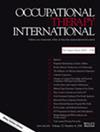The Effect of Leisure Intervention on Occupational Performance and Occupational Balance in Individuals with Substance Use Disorder: A Pilot Study
IF 0.9
4区 医学
Q3 REHABILITATION
引用次数: 0
Abstract
Background and Purpose. Leisure, as an occupation, played a crucial role in promoting individuals’ health and well-being. However, the specific impact of leisure as an intervention for individuals with substance use disorder remains unclear. This pilot study was aimed at investigating the effect of a leisure intervention on occupational performance and occupational balance in individuals with substance use disorder. Methods. The sample for this quasiexperimental pretest–posttest with a two-month follow-up design comprised nine individuals aged between 18 and 55 years, selected using a convenience sampling method. The intervention consisted of a 2-month group leisure participation program, conducted twice a week, followed by a 2-month follow-up period. Primary outcome measures included occupational performance and occupational balance, and secondary outcome measures were leisure participation, quality of life, and drug craving. Outcome measures were assessed three times: preintervention, postintervention, and after the follow-up period. The outcome measures included the Canadian Occupational Performance Measure (COPM), Occupational Balance Questionnaire-11 (OBQ11), Nottingham Leisure Questionnaire (NLQ), 36-Item Short-Form Health Survey (SF-36), and Desire to Drug Questionnaire (DDQ). Data analysis was performed using the Friedman test and Wilcoxon signed-rank test as a post hoc procedure, with a significance level set at 5%. Results. The findings showed significant improvements in participants’ occupational performance in postintervention and follow-up assessments (, ) and better occupational balance from pre- to postintervention (, ) and after the follow-up period (, ). Furthermore, significant enhancements were observed in leisure participation, quality of life, and a reduction in drug craving. Conclusion. The findings indicate that leisure intervention positively impacted both occupational performance and occupational balance, suggesting its potential as a beneficial therapeutic approach for individuals with substance use disorder. Additional research is warranted to delve deeper into and validate the effectiveness of leisure intervention within this specific population.休闲干预对药物使用障碍患者职业表现和职业平衡的影响:试点研究
背景和目的。休闲作为一种职业,在促进个人健康和幸福方面发挥着至关重要的作用。然而,休闲作为一种干预措施对药物使用障碍患者的具体影响仍不清楚。本试验性研究旨在调查休闲干预对药物使用障碍患者的职业表现和职业平衡的影响。研究方法这项为期两个月的随访式实验前测后测样本包括九名年龄在 18 至 55 岁之间的患者,采用便利抽样法选出。干预措施包括为期 2 个月的小组休闲参与计划,每周进行两次,随后进行为期 2 个月的随访。主要结果测量包括职业表现和职业平衡,次要结果测量包括休闲参与、生活质量和药物渴求。结果测量共进行了三次评估:干预前、干预后和随访期结束后。结果测量包括加拿大职业表现测量(COPM)、职业平衡问卷-11(OBQ11)、诺丁汉休闲问卷(NLQ)、36项短式健康调查(SF-36)和药物渴望问卷(DDQ)。数据分析采用弗里德曼检验和 Wilcoxon 符号秩检验作为事后分析程序,显著性水平设定为 5%。结果结果显示,干预后和随访评估中,参与者的职业表现有了明显改善(、),从干预前到干预后(、)以及随访期后(、),职业平衡得到了改善。此外,在休闲参与、生活质量和减少药物渴求方面也有明显改善。结论。研究结果表明,休闲干预对职业表现和职业平衡都有积极影响,这表明休闲干预有可能成为对药物使用障碍患者有益的治疗方法。有必要开展更多研究,以深入探讨和验证休闲干预在这一特定人群中的有效性。
本文章由计算机程序翻译,如有差异,请以英文原文为准。
求助全文
约1分钟内获得全文
求助全文
来源期刊

Occupational Therapy International
REHABILITATION-
CiteScore
2.50
自引率
6.70%
发文量
121
审稿时长
>12 weeks
期刊介绍:
Occupational Therapy International is a peer-reviewed journal, publishing manuscripts that reflect the practice of occupational therapy throughout the world. Research studies or original concept papers are considered for publication. Priority for publication will be given to research studies that provide recommendations for evidence-based practice and demonstrate the effectiveness of a specific treatment method. Single subject case studies evaluating treatment effectiveness are also encouraged. Other topics that are appropriate for the journal include reliability and validity of clinical instruments, assistive technology, community rehabilitation, cultural comparisons, health promotion and wellness.
 求助内容:
求助内容: 应助结果提醒方式:
应助结果提醒方式:


